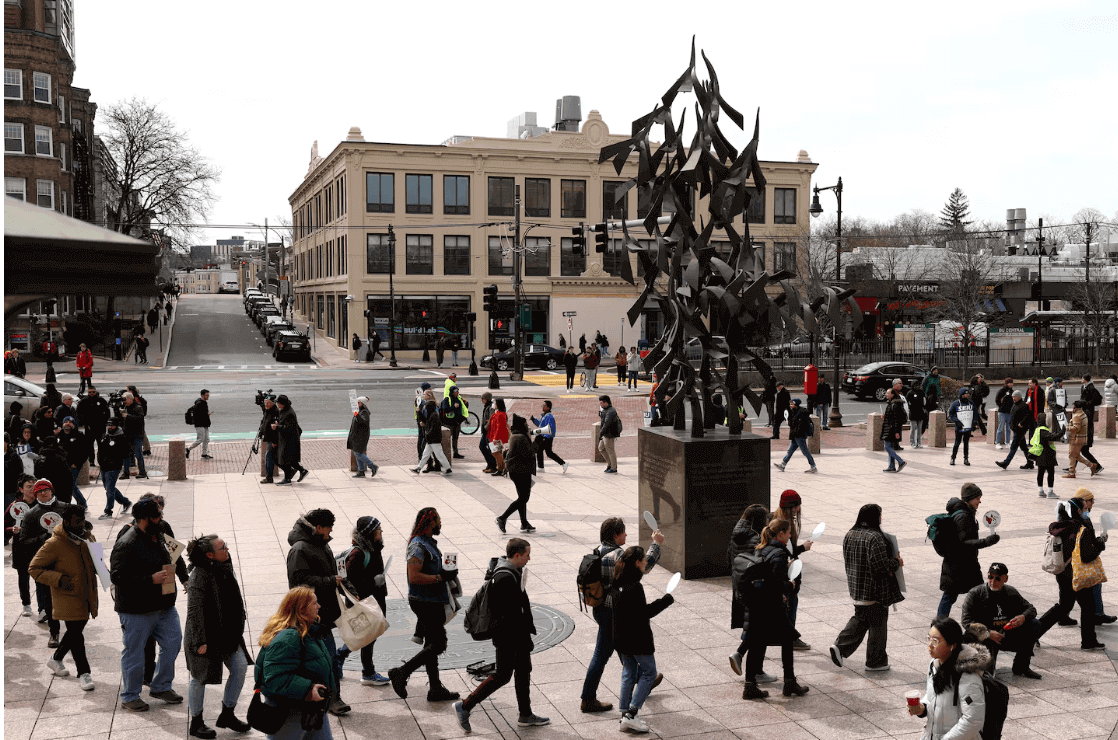波士顿大学表示将不再招收十余门人文和社会科学课程的博士生

【中美创新时报2024 年 11 月 20 日编译讯】(记者温友平编译)波士顿大学(BU)表示,今年将不再招收英语、历史、政治学和其他课程的学生,而就在几周前,研究生们结束了为期七个月的罢工,并获得了大幅加薪。《波士顿环球报》记者Diti Kohli对此作了下述报道。
在研究生工人长时间罢工之后,波士顿大学周二表示,在即将到来的学年,将不再招收包括英语、历史和哲学在内的十余门人文和社会科学课程的任何新博士生。
这是波士顿地区一所主要学校在高等教育的关键时期采取的最激进的成本削减举措之一,因为此时入学人数下降,费用似乎永远在上涨。由于经济危机,新英格兰地区数十所规模较小的院校裁员、削减专业或关闭。但波士顿大学在一份声明中表示,冻结博士课程的决定是基于去年春天一个工作组的建议,旨在让大学在未来保持不至于陷入困境。
“这些行动是波士顿大学重新设想这些课程以实现长期可持续性的承诺的一部分,”声明中写道。“此次暂停和减少学生人数将确保波士顿大学能够履行对目前在校学生的承诺,并为未来的成功做好准备。”
这些课程的申请门户现已关闭,已经申请明年秋季入学的学生将获得申请费退款。
大学发言人科林·莱利拒绝透露有多少申请人受到了影响。波士顿大学目前管理着近 18,000 名研究生,但受该决定影响的博士课程每年最多只有 5 名学生。
但人们质疑此举是否与今年春季和初秋席卷校园的研究生工人长达七个月的罢工有关。罢工于 10 月结束,此前大学同意提高工资,并为大约 3,000 名学生提供保护,这些学生为大学授课并进行研究。
合同将研究生工人的工资提高了 70%,博士生的年薪至少达到 45,000 美元,研究生的时薪达到 20 美元。合同还扩大了医疗福利和育儿假,并引入了年度儿童保育补贴。
上周,文理学院(受影响课程所在地)的负责人在发给教授的电子邮件中表示,新协议将产生“预算影响”,学院必须平衡其“对已经就读我们课程的博士生的现有承诺和明年的招生”。
此前,文理学院的教授们于 9 月收到一条消息,称他们的课程将缩减,部分原因是为了弥补“每个博士生所需的津贴和福利支持增加所带来的大量额外成本”。本周又有消息称,新博士生的招收将完全暂停。
代表工人的工会 SEIU Local 509 在一份声明中表示,“暂停哲学、历史和英语等课程的招生——研究生在大学教学和研究中发挥着重要作用——引发了人们对波士顿大学对这些学科的长期承诺的严重质疑。”
它继续说,“令人担忧的是,大学似乎愿意减少这些领域的学生机会,而且有人认为这一决定与研究生的合同收益有关。”
根据最新的财务报表,该大学的捐赠基金今年稳步增长至 35 亿美元。但其部分运营预算受到了冲击:学校在 2024 财年结束时的净运营收益为 8400 万美元,仅为前一年盈余的一半,这主要是“由于学生经济援助增加”。自 2020 年以来,对学生的援助每年增加近 4000 万美元,总计约 3.7 亿美元。
工会的普通成员表示,削减博士课程的决定与昂贵大学的劳动力分配以及学校愿意向与学术教学密切相关的工人支付多少工资有关。他们警告说,可能会有更多的削减。
“只有资本主义的纲领性危机,劳动力向低工资和临时工作迅速重组,”工会声明中写道。“紧缩政策不会只停留在研究生课程上。问问自己:如果你的工作或你在波士顿大学的位置给这所大学的决策者带来不便,会发生什么?”
一位因害怕报复而要求匿名的艺术与科学研究生院教授表示,取消博士学位课程最终将影响教育质量和学校留住优秀教师的能力。
“这很意外。他们现在告诉我们这只是一项为期一年的措施,”他说。“但我确实相信并希望波士顿大学希望继续成为一所声誉良好的研究型大学,所以他们必须改变路线。”
题图:人们开始质疑,波士顿大学在即将到来的学年削减十余门博士课程的举动是否与研究生工人创纪录的七个月罢工有关。Jessica Rinaldi/Globe Staff
附原英文报道:
BU says it won’t admit PhD students in a dozen humanities and social sciences programs
The college says it will not accept students this year in English, history, political science, and other programs, weeks after graduate students ended their seven-month strike with big pay raises
By Diti Kohli Globe Staff,Updated November 20, 2024
Questions are swirling about how Boston University’s move to cut a dozen PhD programs in the coming academic year is connected to the graduate student workers’ record-breaking seven-month strike.Jessica Rinaldi/Globe Staff
In the wake of a lengthy graduate worker strike, Boston University said Tuesday it will not accept any new PhD students in a dozen humanities and social sciences programs, including English, history, and philosophy, in the coming academic year.
It’s one of the most aggressive cost-cutting moves undertaken by a major Boston-area school amid a critical time in higher education, when enrollment is down and expenses feel forever on the rise. Dozens of smaller New England institutions have cut staff, slashed majors, or closed due to the financial crunch. But BU based its decision to freeze the PhD programs on recommendations last spring from a task force, the school said in a statement, which are aimed at keeping the university above water in the future.
“These actions are part of Boston University’s commitment to re-envision these programs to allow for their long-term sustainability,” it read. “This temporary pause and cohort reduction will ensure BU is able to meet its commitments to currently enrolled students and to set up its future programs for success.”
The application portal for the programs is now closed, and students who have already applied for next fall will be refunded their application fees.
University spokesperson Colin Riley declined to share how many applicants had been affected. BU currently oversees almost 18,000 graduate students, though the PhD programs impacted by the decision can be as small as five people per yearly cohort.
But questions are swirling about whether the move is connected to the seven-month strike by graduate student workers that roiled campus this spring and early fall. It ended in October after the university agreed to higher pay and protections for around 3,000 students, who teach classes and conduct research for the university.
The contract raised pay for graduate workers by as much as 70 percent to at least $45,000 a year for PhDs, and $20 an hour for graduate students. It also expanded health care benefits and parental leave, and introduced an annual subsidy for child care.
In an email to professors last week, the heads of the College of Arts and Sciences — where the affected programs are housed — said the new agreement would have “budgetary implications” and that the college must balance its “existing commitments to the doctoral students already enrolled in our programs and admissions for next year.”
That followed a message in September, when professors within the Graduate School of Arts and Sciences were originally told that their programs would be curtailed, in part to make up for “significant additional cost for increased stipend and benefits support needed per PhD.” This week came the news that new PhDs would be on hold entirely.
In a statement, SEIU Local 509, the union that represents the workers, said “the suspension of admissions to programs such as Philosophy, History, and English — fields where graduate workers play an essential role in teaching and research at the university — raises serious questions about BU’s long-term commitment to these academic disciplines.”
It continued, it is “concerning that the university appears willing to reduce opportunities for students in these fields and that there have been suggestions that this decision is tied to the contractual gains of graduate workers.”
The university saw its endowment grow steadily to $3.5 billion this year, according to the latest financial statements. But parts of its operating budget have taken a hit: The school ended the 2024 fiscal year with a net operating gain of $84 million, just half its surplus from the year before, largely “due to increased student financial aid.” Aid to students increased by nearly $40 million per year since 2020, or around $370 million total.
Rank-and-file members of the union said the decision to cut PhD programs is tied to the distribution of labor at pricey universities, and what schools are willing to pay workers who are involved closely with academic instruction. They warned that more cuts could be coming.
“There are only the programmatic crises of capitalism, the swiftly accelerating restructuring of labor toward lower wages and temporary work,” a union statement read. “Austerity won’t just stop with graduate programs. Ask yourself: what would happen if your job or your place at BU becomes an inconvenience for the decision-makers of this university?”
A professor within the Graduate School of Arts and Sciences, who asked to remain anonymous due to fear of retribution, said rolling back PhD programs will ultimately impact the quality of education and the school’s ability to retain quality faculty.
“It was a surprise. They’ve told us now that this is just a one-year measure,” he said. “But I do believe and hope that BU wants to remain a research university in good standing, so they’ll have to change course.”

